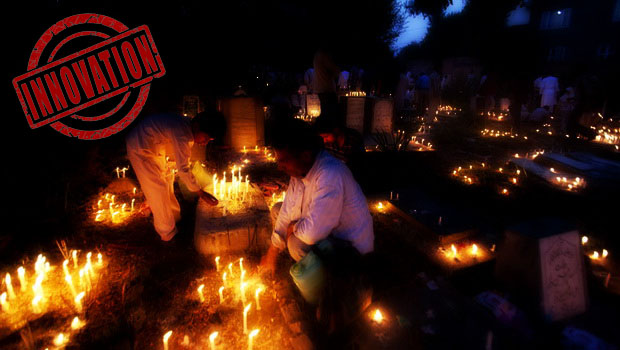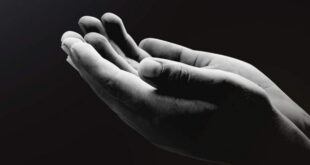Praise be to Allah.
Some Muslims celebrate the middle of Sha’baan, fasting on that day and spending that night in prayer (qiyaam). There is a hadeeth concerning that which is not saheeh, hence the scholars regarded celebrating this day as an innovation (bid’ah).
Muhammad ‘Abd al-Salaam al-Shuqayri said: Imam al-Fatni said in Tadhkirat al-Mawdoo’aat: “Among the innovations that have been introduced on “Laylat an-Nusf” (mid-Sha’baan) is al-Salaat al-Alfiyyah, which is one hundred rak’ahs in which Soorat al-Ikhlaas is recited ten times in each rak’ah, offered in congregation; they pay more attention to this than to Jumu’ah and Eid prayers, although there is no report concerning it, except da’eef (weak) and mawdoo’ (fabricated) reports, and we should not be deceived by the fact that these reports were quoted by the authors of al-Qootand al-Ihya’ and others, nor should we be deceived by what was mentioned in Tafseer al-Tha’labi, that it is Laylat al-Qadr.” End quote.
Al-‘Iraaqi said: “The hadeeth about the prayer on Laylat al-Nisf (mid-Sha’baan) is false.” Ibn al-Jawzi narrated it in al-Mawdoo’aat (which is a compilation of fabricated hadeeths):
Chapter on the hadeeth, prayer and supplication on Laylat al-Nisf:
“The hadeeth, “When the night of ‘nisf Sha’baan’ (mid-Sha’baan) comes, spend the night in prayer and fast on that day” was narrated by Ibn Maajah from ‘Ali. Muhashiyyah said: (It was also narrated) in al-Zawaa’id. Its isnaad is da’eef (weak) because of the weakness of Ibn Abi Basrah, of whom Ahmad and Ibn Ma’een said: He fabricates hadeeth.” End quote.
Praying six rak’ahs on Laylat al-Nisf with the intention of warding off calamity, having a long life and being independent of people, and reciting Ya-Seen and offering du’a in between that — there is no doubt that this is something that has been introduced into the religion and is contrary to the Sunnah of the Messenger of Allah (blessings and peace of Allah be upon him).
The commentator on al-Ihya’ said: This prayer is well known in the books of later Sufi masters, but I have not seen any saheeh report in the Sunnah to support it and the connected du’a. Rather this is the action of some shaykhs.
Our companions said: “It is makrooh to gather on any of the nights mentioned in the mosques or elsewhere.”
Al-Najm al-Ghayti said, describing spending the night of al-Nisf min Sh’baan (mid-Sha’baan) praying in congregation: “That was denounced by most of the scholars of the Hijaz, including ‘Ata’ and Ibn Abi Mulaykah, the fuqaha’ of Madinah and the companions of Maalik. They said: All of that is an innovation (bid’ah) and there is no report to suggest that the Prophet spent that night in praying in congregation or that his Companions did that either.”
Al-Nawawi said: “The prayers of Rajab and Sha’baan are two reprehensible innovations.” End quote from al-Sunan wa’l-Mubtada’aat, p. 144
Al-Fatni (may Allah have mercy on him) said, after the comments quoted above: “The common folk are so infatuated with this prayer that they stored up a lot of fuel for it and many evils resulted from it, and many transgressions are committed which we do no need to describe. (It is so bad that) the close friends of Allah feared His punishment and fled into the wilderness. The first time this prayer occurred was in Bayt al-Maqdis (Jerusalem) in 448 AH.”
Zayd ibn Aslam said: “We never saw any of our shaykhs or fuqaha’ saying that Laylat al-Baraa’ah (15 Sha’baan) had any superiority over other nights.” Ibn Dihyah said: “The hadeeths about the prayer on Laylat al-Baraa’ah are fabricated and one has an interruption in the isnaad. Anyone who acts upon a report which is known to be false is a servant of the Shaytaan.” End quote from Tadhkirat al-Mawdoo’aat by al-Fatni, p. 45
See: al-Mawdoo’aat by Ibn al-Jawzi, 2/127; al-Manaar al-Muneef fil Saheeh wa’l-Da’eef by Ibn al-Qayyim, p. 98; al-Fawaa’id al-Majmoo’ah by al-Shawkaani, p. 51
Some people use the word al-Sha’baaniyyah to refer to the last days of Sha’baan, and say, “These are the days of bidding farewell to food,” and they take advantage of these days to eat a lot before Ramadan begins. Some scholars say that this idea was originally taken from the Christians, who used to do that as their fasting period (Lent) approached.
To sum up, there is no celebration in Sha’baan and there is no special act of worship to be performed in the middle of it or during the last days of the month. Doing that is an innovation that has been introduced into the religion.
Allah says:
“Whoever goes right, then he goes right only for the benefit of his ownself. And whoever goes astray, then he goes astray to his own loss. No one laden with burdens can bear another’s burden. And We never punish until We have sent a Messenger (to give warning).” [Quran, 17:15]
And Allah knows best.
 navedz.com a muslim's Quest for the truth
navedz.com a muslim's Quest for the truth










why is being submissive to our creator regardless the time of the month or year be subjected to silly blabbering about innovations? I al led to believe that we are commanded to submit to the Master of the Universe every minute of our waking hours, it now seems that this is not so since some of these form of submissions are being frowned upon.
@Nazim
Firstly, it is the intention in a person’s heart of what he wants to do.
We should Pray to Allah alone, and only the way we have been prescribed to do. For eample, while praying salaah, we do 2 sujoods for each unit of salaah. If we do 3 sujood, it will be rejected because that is not prescribed.
Similarly, taking the mid of shabaan as a special occasions, is something which has been introduced by us people and it is not from the prophet (peace and blessings of Allah be upon him).
Allah says:
“Say (O Muhammad): ‘If you (really) love Allah, then follow me, Allah will love you and forgive you your sins. And Allah is Oft-Forgiving, Most Merciful.
Say: ‘Obey Allah and the Messenger.’ But if they turn away, then Allah does not like the disbelievers.” [Aal ‘Imraan 3:31-32]
The first aayah explains that love is just a claim, but the proof of sincerity is following what the Prophet (peace and blessings of Allah be upon him) brought. The second aayah reaffirms the importance and necessity of obeying Allah and His Messenger. Hence Allah ended the aayah with a very stern warning in which those who refuse to obey are described as kaafirs, and Allah does not love the disbelievers.
We ask Allah to keep us safe from that. The Prophet (peace and blessings of Allah be upon him) told us of the danger of not obeying him, and the danger of adding to what he brought. For example, The celebration of Mawlid or his birthday is indeed an addition to what he brought, so is the mid-shabaan, as all the scholars agree. He said: “The best of speech is the Book of Allah, and the best of guidance is the guidance of Muhammad. The most evil of things are those which are newly-invented (in religion), and every innovation is a going astray.” (Reported by Muslim and al-Nisaa’i).
Secondly, if praying at night and keeping fast is something which a person does regularly and does not single out a particular day of mid-shabaan for this, then there is no wrong in it, if his intention is do offer his normal prayers.
And Allah knows best.